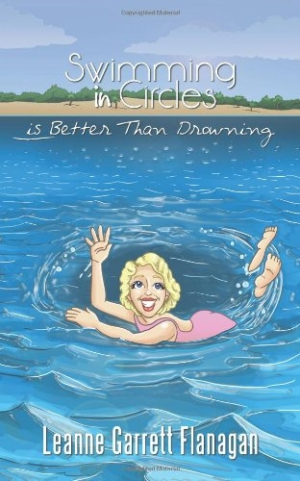Swimming in Circles is Better Than Drowning
Flanagan’s voice—of a woman who came of age in the 1960s—reverberates throughout this well-written memoir.
In Swimming in Circles is Better Than Drowning, a baby boomer reflects candidly on life lessons learned on her journey from the innocent 1950s to her status today as a retired grandmother. Packed with humor, pathos, and wit, this book is a gem.
The author’s early years are ones of privilege as she grows up the only daughter of a business executive and his homemaker wife in suburban New Jersey. She partakes in music and dance lessons and lives in a custom-built home where she will later think of herself as a “princess from the Ivory Tower.” At age eleven, her life is upended with the tragic death of her father, which catapults her mother into a decades-long depression and alcoholism.
The book is at its best when the author details her early years. Flanagan reminisces about her favorite television show, The Mickey Mouse Club. “I even begged my parents to move to California so that I, too, could be on TV with Annette, Darlene, Cubby, Karen, Bobby, and the rest of the gang,” she writes.
Flanagan delves into her marriage, the birth of her two daughters at a time when prenatal education classes were limited, and dealing with the eventual diagnosis of her mother’s illnesses. After this point, the story becomes somewhat uneven as she glosses over the next twenty-five years. Perhaps, as we eventually learn, it’s because this is when Flanagan begins dealing with a personal crisis—recognition that she has her own issues with alcohol. With group support, she journeys back to the woman she once was, but fills in just a few concrete details of this time period. Because she is so forthcoming in earlier chapters, this may be disappointing to those who have become invested in her story.
Early black-and-white family photos are sprinkled in, as is some of the author’s poetry; more reflective pieces appear toward the end of the book. The poems are thoughtful and explore Flanagan’s various struggles. Their presence could be seen as making the narration disjointed, but they are very much a part of her story. Flanagan’s voice—of a woman who came of age in the 1960s—reverberates throughout.
Because she has written in so much detail about her early years, it’s disappointing that more isn’t included about Flanagan’s “prince charming,” her husband, Bob. She offers just a few morsels: “I fell in love with his warmth, wit, sense of humor, honesty and oh, those magnificent crystal clear blue eyes!”
Nearly perfectly edited, the book’s last few chapters deal with a variety of topics, including the author getting out of her comfort zone to attend a writer’s workshop in New York City, this book being the direct result of that action.
Insights offered by Flanagan may be helpful to others who need a little hope in their lives, or to those who simply enjoy learning another’s take on life.
Reviewed by
Robin Farrell Edmunds
Disclosure: This article is not an endorsement, but a review. The publisher of this book provided free copies of the book and paid a small fee to have their book reviewed by a professional reviewer. Foreword Reviews and Clarion Reviews make no guarantee that the publisher will receive a positive review. Foreword Magazine, Inc. is disclosing this in accordance with the Federal Trade Commission’s 16 CFR, Part 255.

